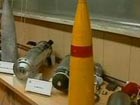| Videos | ? Latest |
|
? Feature | ? Sports | ? Your Videos |
Iran unveils smart laser-guided projectile

 0 Comment(s)
0 Comment(s) Print
Print E-mail
CNTV, January 31, 2012
E-mail
CNTV, January 31, 2012
Iran claims it has produced laser-guided artillery shells, capable of hitting moving targets with high accuracy. The announcement comes amid rising tension in the Gulf over the tightening sanctions against the Islamic Republic.
The report came Monday from Iran's state television. Quoting Defence Minister General Ahmad Vahidi, it claimed the shell was an "intelligent" munition with the capability to identify its own targets. It did not give details on specifications of the shell.
Iran occasionally announces the production and testing of military equipment, ranging from torpedoes and missiles to jet fighters.
The country's military has run a program dating from 1992 which aims at self-sufficiency in producing modern weaponry.
During a news conference on Monday, a senior Iranian military commander said that Tehran was planning to unveil new "satellites and satellite carrier missiles" during the next ten days when the country is celebrating the anniversary of the 1979 Islamic revolution.
Massoud Jazayeri, who is deputy head of Iran's Joint Armed Forces Staff, also warned that his country's response to any "hostile behaviour" in the region will be "destructive".
Massoud Jazayeri said, "We have stressed and continue to stress that they should have distance from the region because their presence will increase the possibility of conflict. We will respond to any threat or aggressive action in a crushing manner. Our response will definitely lead them to regret their actions. We hope that this doesn't happen. If it does happen however, history will prove whether it is Iran or the U.S. that just talks."
The statement came as a new front against Iran's leadership has been forming, with a punishing oil embargo imposed by the EU.
The decision taken by the EU last week follows the US lead to target Iran's critical oil exports. It puts pressure on the country from many directions, including intense US lobbying to urge Asian powers to shun Iranian crude, a nose-diving national currency and a recent slaying in what Iran calls a clandestine campaign against its nuclear establishment.
The US sanctions outraged Iranian officials, prompting repeated threats from various officials that the country could close the vital Strait of Hormuz if the measures are enacted.
Roughly a fifth of the world's oil passes through the narrow waterway, and the US has warned Iran it will not allow it to impede the free flow of traffic in the area.





